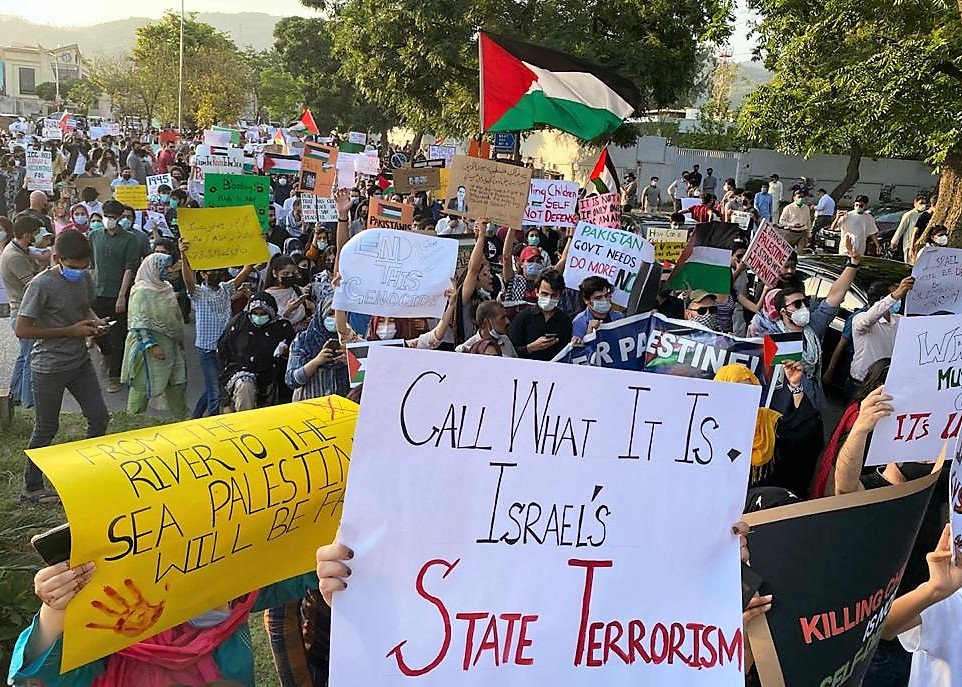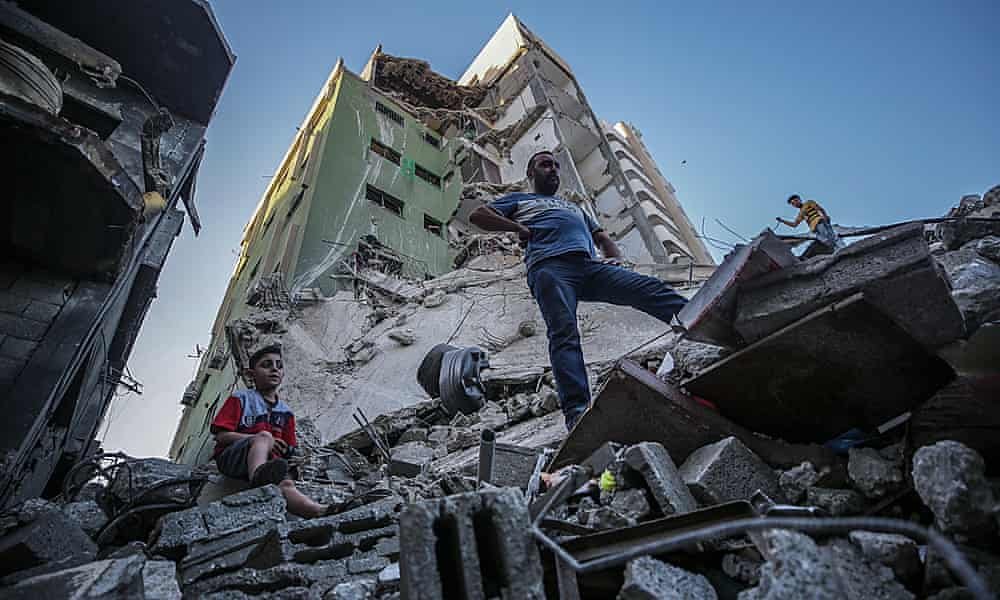The recent atrocities committed by Israel in Gaza, particularly at Al-Aqsa Compound and the siege of Sheikh Jarrah has once again brought the Palestinian issue into the limelight.

These heart rending scenes of deaths and destruction triggered massive protests across the world in solidarity with Palestinians and against Israeli brutality compelling the Arab states who have signed trade and diplomatic agreements with the Zionist state to condemn its atrocities and its allies in the West to pressurize Jerusalem to cease fire.
In the face of the current spate of violence and uprising, the US and its Arab allies particularly Saudi Arabia, United Arab Emirate (UAE), Bahrain and Egypt fear the potential spread of a new wave of resistance throughout the region. Because, unlike their rulers, the hearts and sympathies of their people resonate with Palestinians.
For the US, Israel is its most important ally and a watchdog for its interests in the Middle East. Hence, it has been investing billions of dollars to ensure the superiority of Israel in the region and enhance its military power. In the middle of the crisis Joe Bidden approved $730 billion sale of arms to Israel, prompting a strong criticism within the Democratic Party and outside against the decision.
It is important to understand that why the Majority of Muslim states, particularly the Arab monarchs and dictators are hesitant to provide any tangible support to Palestinian resistance movement and just paying lip service? The most effective indigenous Palestinian resistance is not only a threat to Arab monarchic and dictatorial regimes but also a major challenge for American neoliberal capitalist expansion in the region as well as the Israeli colonial settler occupation.
Traditionally, Palestinians in their fight with Israel have been depending on small armed groups, politico-economic support from some Middle East states, or moral and diplomatic support from a few European and Latin American states. This approach and outlook of Palestinians serve nothing except reducing their own political role.
Resultantly, a weak political movement provides an opportunity to different countries to use armed outfits as their proxies. Currently, there is no second opinion about the notion that the pro-independence and resistance movements are more interested in getting funds and charities than anything else. Moreover, there is not only a lack of coordination, common planning, communication, and strategies among the Palestinian groups but at times they work against each other. Whenever there is an uprising against Israeli occupation and expansionist policies, these armed groups exploit the situation for their political ends through their political wings with electoral influence in different areas.
The rest of the world, especially the Muslim states, is caught in the magic of rocket firing unable to understand the internal fissures within the Palestinian leadership. Therefore, rocket firing is more of showcasing something to suit the psyche of people outside Palestine thereby winning sympathies from around the world.
Thus, the rocket firing by Hamas on the Israeli cities is a tactic to keep itself at the centre of the conflict and stay in the limelight in order to reap gain political and financial gains by proving itself to be the sole resistance force against Israel to reckon with.
Hamas knows very well that its rockets cannot do any significant damage to Israel. It even does not care when in retaliation Israel launches carpet bombing on innocent Palestinians turning cities into complete debris.
It weakens the moral support and sympathies for Palestinians, provides an opportunity to Israeli authorities and colonial powers to crush protests, rallies, and sit-ins against the Israeli brutalities. The world also starts to look at the Palestinians as if they were a stakeholder in the initiation of this war.
Similarly, the international media also portrays the situation as a conflict between Israel and Palestine. Then we hear about “intense fighting between Hamas and Israel. This is how a cover-up is provided to the naked aggression and brutal acts of Israel.
Another unrealistic approach is looking at the conflict from a religious lens. The separate religious identities of Arabs and Jews are considered to be the prime bone of contention. The reality is otherwise. It is not at all a religious issue; it is rather a national issue and occupation of land. It is a struggle by indigenous Palestinians to reclaim their land occupied by the colonial settlers, resist further settlements and their evictions. The Palestinians struggle for the recognition of their fundamental and democratic rights.
Every person who is against apartheid, racism, war, and capitalism should support Palestinians. Similarly, a common Israeli should understand that the war on Palestinians will only serve a ruling elite and ultranationalist warmongers. It would rather exacerbate poverty, unemployment and cause socio-economic degradation.
Thus the poor Israel citizens will also become a victim of Israel’s colonial occupation project who remain a mere spectators in this whole scenario. Although the progressive groups particularly the Communist Party of Israel which has two members in the parliament staged a protest against the ultranationalist rightwing government of Netanyahu, there is a need for raising an effective voice against the Israeli brutalities from within the country. The day the Israeli people will express solidarity with Palestinians in sheer disregard of their state’s colonial expansionist policies will be the beggining of the end of Israeli brutalities.
Both the first and the second Palestinian Intifadas were the real examples of people’s uprising which had surprised both the Palestine Liberation Organization (PLO) and Hamas leadership. This is also imperative for the Palestinians to broaden the base of their movement by mobilising people for the independence of Palestine on revolutionary lines as well as through popularly elected committees.
Palestinians should also understand that the current Palestinian, Arab, American, Israeli and Islamic leadership have completely failed in the resolution of the seven-decade longstanding issue. They have not only failed but also have practically absolved themselves of this responsibility. Hence, no power from outside Palestine can solve the issue.
One of the political solutions to the Palestinian issue is to establish a secular democratic state where Muslims, Jews and Christians co-exist with harmony as equal citizens. Only this single state narrative can serve as a guarantee to shun any move to divide the society on a religious, ethnic, or racial basis. If Palestinians carry on their struggle on these lines then there is a hope that their miseries will end and they will achieve their goal.

Dr Asghar Dashti is Chairman, International Relations Department, Federal Urdu University of Arts, Sciences and Technology, Karachi.

The High Asia Herald is a member of High Asia Media Group — a window to High Asia and Central Asia

